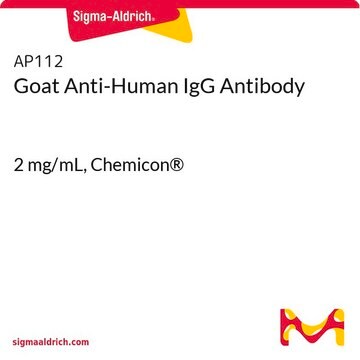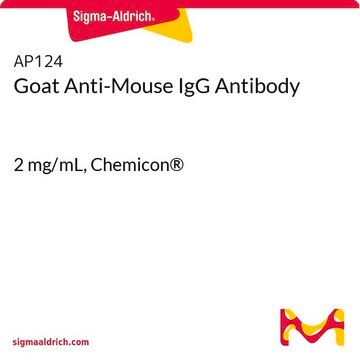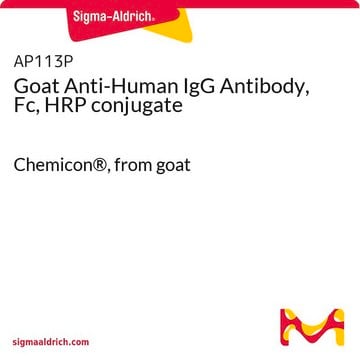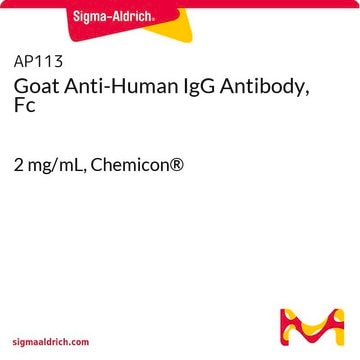AP113A
Goat Anti-Human IgG Antibody, Fc, Alkaline Phosphatase conjugate
Chemicon®, from goat
About This Item
Productos recomendados
biological source
goat
Quality Level
conjugate
alkaline phosphatase conjugate
antibody form
affinity purified immunoglobulin
antibody product type
secondary antibodies
clone
polyclonal
species reactivity
human
manufacturer/tradename
Chemicon®
technique(s)
ELISA: suitable
western blot: suitable
isotype
IgG
shipped in
wet ice
target post-translational modification
unmodified
General description
Specificity
Application
Secondary & Control Antibodies
Fragment Specific Secondary Antibodies
1:5,000-1:50,000 dilution can be used.
Optimal working dilutions must be determined by the end user.
Quality
ELISA:
1:5,000-1:50,000 dilution can be used.
Linkage
Physical form
RECONSTITUTION:
Reconstitute with sterile distilled water to match the volume indicated on the vial label. Centrifuge product if it is not completely clear after standing for 1-2 hours at room temperature.
Storage and Stability
After reconstitution the product is stable for several weeks at 2–8°C as an undiluted liquid. After dilution do not use for more than one day. For extended storage after reconstitution, add an equal volume of glycerol (ACS grade for better) to make a final concentration of 50% glycerol followed by storage at -20°C in undiluted aliquots for up to 12 months. Please note the concentration of protein (and buffer salts) will decrease to one-half of the original after the addition of glycerol. Avoid repeated freeze/thaw cycles.
Legal Information
Disclaimer
Not finding the right product?
Try our Herramienta de selección de productos.
signalword
Warning
hcodes
Hazard Classifications
Acute Tox. 4 Dermal - Acute Tox. 4 Inhalation - Aquatic Chronic 3
Storage Class
11 - Combustible Solids
wgk_germany
WGK 3
Certificados de análisis (COA)
Busque Certificados de análisis (COA) introduciendo el número de lote del producto. Los números de lote se encuentran en la etiqueta del producto después de las palabras «Lot» o «Batch»
¿Ya tiene este producto?
Encuentre la documentación para los productos que ha comprado recientemente en la Biblioteca de documentos.
Nuestro equipo de científicos tiene experiencia en todas las áreas de investigación: Ciencias de la vida, Ciencia de los materiales, Síntesis química, Cromatografía, Analítica y muchas otras.
Póngase en contacto con el Servicio técnico









